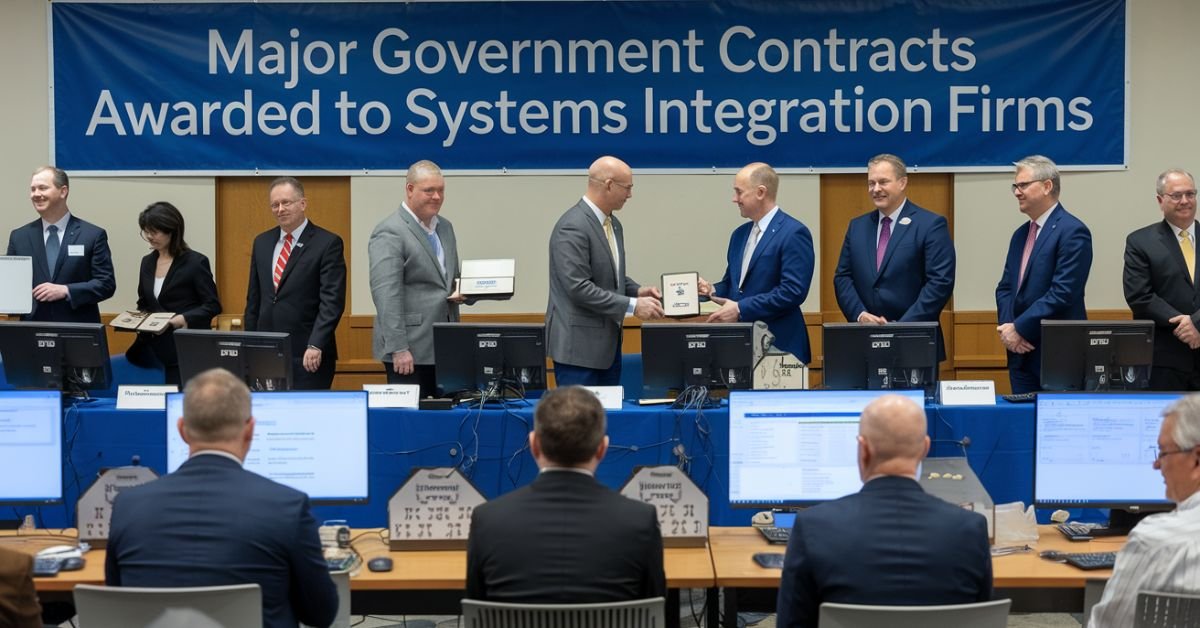Major government contracts for systems integration firms involve huge projects outsourced to companies specializing in integrating various subsystems into one coherent unit.
These deals usually revolve around modernizing or constructing advanced technological infrastructure for government organizations.
This is the billion-dollar deals with state-of-the-art tech; this is the world of major government contracts for systems integration. These gigantic projects are revolutionizing everything in our country’s operations from defense and healthcare.
Recent awards have seen tech giants and specialized firms securing contracts worth hundreds of millions. These projects range from modernizing military communications to overhauling federal agency IT systems.
Overview of Systems Integration in Government Contracts
It refers to the integration of several technologies and systems together so they can work in concert with one another. In government contracts therefore this means that the solutions for software and hardware must meet the operational needs of the government. This effective integration can also improve efficiency and cut down costs for the government agencies.
Government contracts are mostly order-specific-requests in which tailored solutions are required from the systems integrators. Such firms need to be knowledgeable about complex regulations and capable of handling large projects. In view of the growth in technology there is an ever-increasing need for developing new systems integration within the public sector.
Top Systems Integration Firms Securing Major Contracts
There are a few giant players in the systems integration industry, who command an important portion of the government contract landscape. Companies like Booz Allen Hamilton and Lockheed Martin are well known for their competencies and trustworthiness. They have continually won large contracts because of their proven records in handling governmental contracts.
These top integrators therefore provide wide-ranging services from cybersecurity to cloud solutions and the flexibility to adjust to changing technology needs is critical in winning the contract. With growing competition, these firms continue to innovate to stay ahead of the market curve.
Recent Trends in Government Contract Awards
It is now skewed towards technologies and their solutions agencies are demanding more cybersecurity and cloud services. This current requirement further builds upon the ones recently made for security and operational efficiency.
In government contracts small businesses have better opportunities as well. Agencies are incentivized to diversify their suppliers through this move to promote greater competition in a contracting landscape.
Impact of Major Contracts on Systems Integration Companies
Large contracts drive most of the growth for systems integration companies. The best news from such large contracts typically translates into higher revenues and better resources. Those funds can give substantial support to investments in new technologies and talent.
Large contracts also enhance the reputation of a company in the market. Positive results of a given project open up more opportunities and collaborative work. Although losing those contracts adds experience to the firm’s capability, which in turn makes it better prepared for the next bids, winning them adds significant experience to the firm’s capability too, and gives it a better foundation for its next bids.
Case Studies: Successful Systems Integration Projects
Perhaps one case study that stands out is the implementation of a national emergency response system. This project created a much more cohesive relationship among responders and agencies to function together better. The effective successful implementation demonstrated the advantages of near real-time information sharing.
Another was IT infrastructure modernization in a government agency. Integration streamlined operations and saved a huge amount of money. These examples demonstrate a case about how effective systems integration will bring quality service and added efficiency.
Challenges Faced by Systems Integration Firms in Contract Bidding
Systems integration companies tend to face stiff competition while tendering for tenders. Most companies are targeting the same window of opportunity, making it difficult to get an advantage over the rest. Moreover tendering is often a complex and time-consuming process.
Compliance with strict regulations and compliance also presents a challenge for companies. Understanding these rules is vital in the presentation of tenders. Scarce resources are likely to exacerbate competition by small firms against larger ones.
The Role of Technology in Awarding Government Contracts
Technology is very central to the contracting process between the government and its other parties. By using it technology will make it easier and faster in processing the submission and evaluation of bids submitted by most agencies for contractors. Technology provides better transparency among the agencies and the contractors through online platforms.
The better advanced data analytics aid in making agency decisions. These tools can help in evaluating vendor capabilities and past performance that affects awarding government contracts. Overall technology enhances fairness and accuracy in awarding government contracts.
Future Projections for Systems Integration in Government Contracts
It appears that the future of system integration in the government contracts market is bright. Demand for innovative technology solutions will increase rapidly. This pertains to areas such as artificial intelligence and cloud computing.
In addition, cooperation with small businesses will be even more important. Agencies desire greater diversity of suppliers and innovation. As technological changes become more advanced, systems integration firms must adapt to new challenges and opportunities.
Evaluating the Criteria for Major Contract Awards
Evaluating major contract award criteria involves several key aspects. Agencies consider the past performance technical expertise and cost efficiency of firms they may contract with. These aspects ensure that the firms deliver excellent quality after selection.
Regulatory and security compliance is of paramount importance. Bidders should be able to meet the set standards. The evaluation process by agencies is geared toward providing them with information to avoid risks and make better decisions.
Notable Government Agencies and Their Contracts with Systems Integrators
The government agencies mostly frequently hire systems integrators in major projects. Some of the departments that come into the limelight include the Department of Defense and the Department of Homeland Security. These are the biggest players that rely on the services of integrators in access to critical technology and security solutions.
They include some major IT modernization and cybersecurity initiatives. Effective partnerships have a positive impact on the agencies’ capabilities and public service. Some of the most prominent systems integrators collaborate with these agencies to address their sophisticated and changing needs.
The Competitive Landscape of Systems Integration Firms
The competitive landscape the system integrations firms operate in is rather dynamic. This is because a vast number of companies are competing for government tenders which is a very tough environment. The leading firms allocate more funds towards innovation to create an edge in terms of being cutting edge.
The small firms are also making their mark by specializing in specific services. These usually come in as unique remedies to specific needs. This diversity creates a competitive market that benefits the government agencies.
Regulatory Considerations for Government Contract Awards
Regulatory considerations are an integral part of the government contract award process. Agencies strictly adhere to instructions for reasons of fairness and transparency. These regulations prevent fraud and provide room for accountability.
Companies also have a few legal requirements when tendering to bid for contracts. The primary ones are sound financial stability and reasonable security measures. Proper understanding of these regulations is crucial for a successful bidding strategy.
The Economic Impact of Major Contracts on Local Economies
Major government contracts also give a big boost to local economies. Those contracts create jobs and increase business growth in the local district. Generally increased spending from contract work brings better community resources.
Moreover these contracts stimulate investments. The beneficiaries of these jobs include Local service providers and subcontractors. Generally speaking large contracts spur local economic growth and stability.
Lessons Learned from Major Systems Integration Failures
Usually, the importance of effective communication between stakeholders becomes glaring upon systems integration failures. A project delay and increasing costs may arise from non-understanding. Due to this reason the proper channels of communication are essential to achieve a successful project.
Another crucial lesson derived from any systems integration failure is that there is a need for proper planning and risk management. Most failures have come from an improper assessment of possible risks. The better one prepares for eventualities and makes proper preparations the easier it will be in later stages especially on future projects.
Frequently asked question
.What are major government contracts?
They are large agreements for providing goods or services to government agencies.
What is a systems integration firm?
A company that combines various technologies to create cohesive systems.
Why do governments choose systems integrators?
To leverage their expertise and improve operational efficiency.
Conclusion
Major government contracts play a vital role in enhancing public sector efficiency. Systems integration firms provide the expertise needed to modernize technologies and improve services. As government needs evolve these contracts will continue to shape the landscape of technology solutions.
Looking ahead the demand for innovative systems integration will likely grow. Firms that adapt to new challenges and technologies will thrive in this competitive market. Ultimately successful partnerships between government agencies and integrators will benefit communities and drive economic development.




